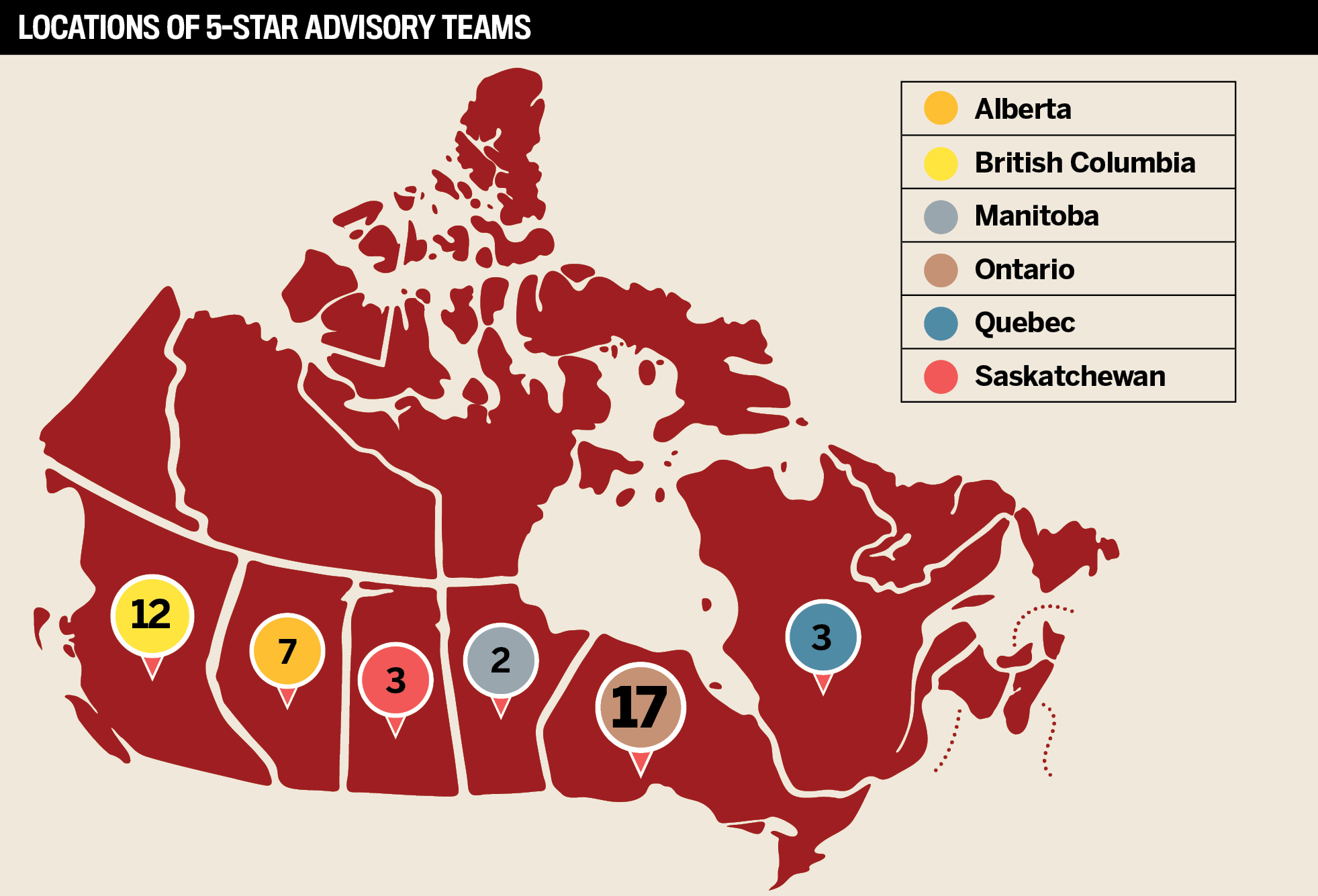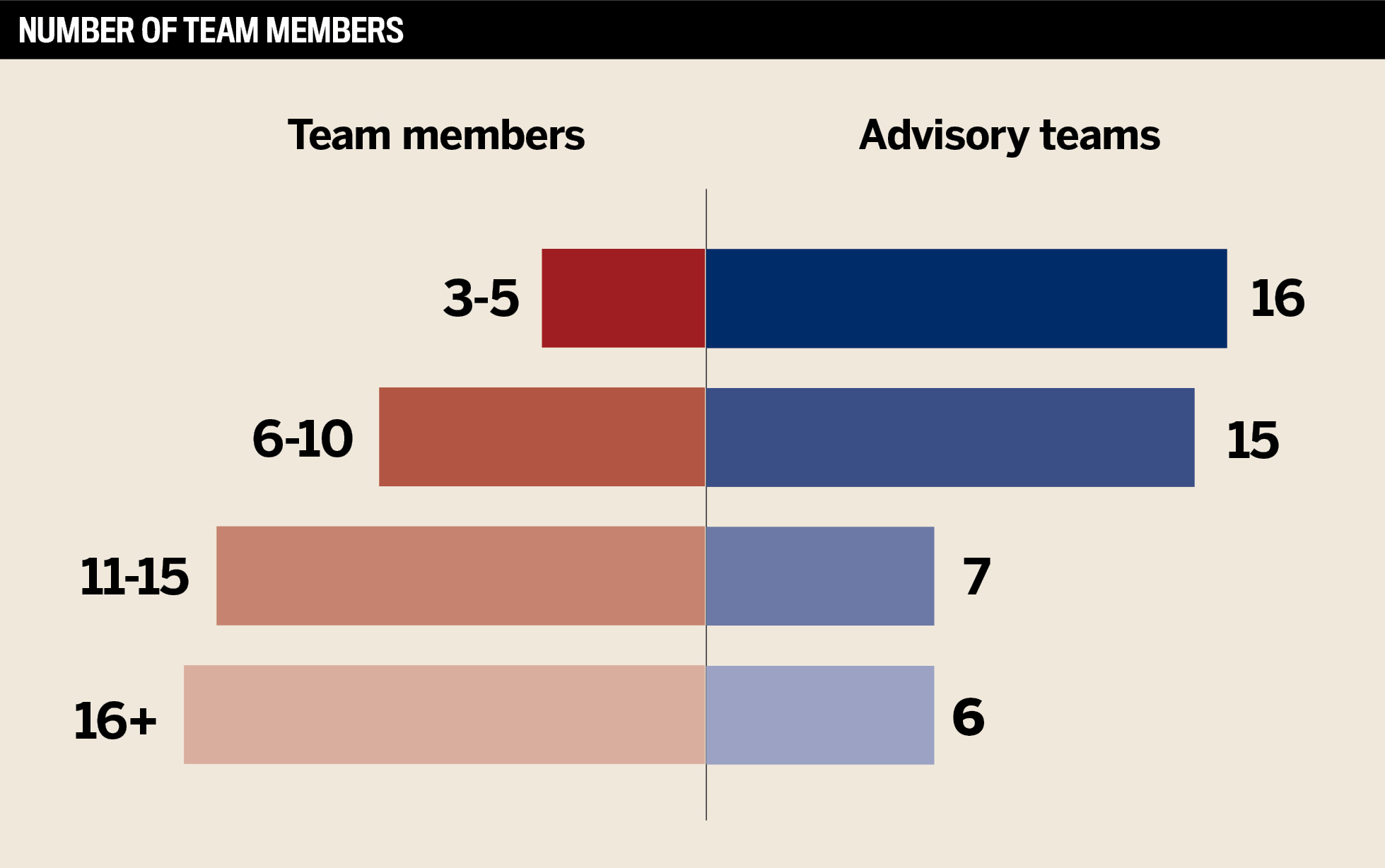

Jump to winners | Jump to methodology
For the wealth management industry, the stakes are as high as they’ve ever been.
Faced with tightening regulation, mounting competition, and increasingly cost-conscious clients, advisors and teams are having to justify their fees by expanding and elevating their service offering. As the Covid-19 pandemic whetted consumers’ appetite for all things digital, wealth professionals are pivoting hard to embrace technology, while taking care not to lose sight of the human side of their business.
“Clients want to know: What’s the best product out there? as opposed to What’s the best product on your product shelf? … [W]e are seeing a rise in advisors leaving for independent firms where they can perform as a fiduciary for clients”
Andrew Feindel and Kyle Richie, Richie Feindel Wealth Management

That’s not to mention the current economic and market environment. As record-high inflation and rising rates test the limits of countless investment, retirement, and estate plans, it’s hard to imagine a more crucial time for advisory teams to earn clients’ trust, whether by finding innovative investment solutions or showing a keen understanding of their unique circumstances and needs.
All of these speak to the crucial value of advice. In a recent study conducted by Russell Investments Canada, a Canadian advisor who delivers full-service comprehensive wealth management – which includes active rebalancing of portfolios, behavioural coaching, customized client experience and family wealth planning, and tax-smart planning and investing – effectively provides 3.85% in added value to their clients’ portfolios.
With this report, Wealth Professional celebrates 44 teams that have faced those headwinds and more in stride, snatched opportunities from challenges, and pushed their limits with one goal: to act in their clients’ best interests with comprehensive wealth service.
After years of being in the spotlight, fees continue to be a focal point for clients. In a recent survey by Refinitiv, three-fifths of investors said they prioritize fees and costs when choosing an advisor. With greater access than ever to information, clients are also more able to push back and interrogate investment options and recommendations.
“Transparency on fees, which we applaud, has been a front and centre topic of conversation,” says Nigel Seth, senior associate wealth advisor at the Schmidt Investment Group, CIBC Wood Gundy. “The drive by the industry to make all fees transparent will make the investment landscape that much better when clients [can] make an informed decision when selecting an advisor.”
“Clients want to know: ‘What’s the best product out there?’ as opposed to ‘What’s the best product on your product shelf?’ Does their firm have access to alternatives or is it simply mutual funds, or stocks and bonds only?” says Andrew Feindel, investment advisor at Richie Feindel Wealth Management, Richardson Wealth.
“With that backdrop, we are seeing a rise in advisors leaving for independent firms where they can perform as a fiduciary for clients, offering not only potentially more competitive fee structures but also more available options,” says Kyle Richie, investment advisor and Feindel’s partner at RFWM.
Amid the climate of continued cost-consciousness, conversations are turning inevitably towards how advisory teams can add value to their clients’ lives and set themselves apart from the competition. Overwhelmingly, the answer they arrive at is to go beyond financial products and investment recommendations by engaging in holistic planning.
“Advisors have to ask themselves some important questions. What am I doing for clients above and beyond managing their portfolio? Do all clients have a written financial plan that best communicates their goals aligned with the financial ideas we have implemented? And do I have a full grasp of all the financial strategies out there that may apply to their situation?” Feindel says.
Also imperative for the industry is the need to embrace personalization. Instead of one-size-fits-all service, the best advisory teams are able to retain clients and grow their business by providing advice that’s not just suitable, but truly tailored. That focus on quality may require them to consider having a smaller book of business, or to specialize in a specific niche of clientele.
“It's important for you as an advisor to understand who your ideal client is so you’re able to service that client, versus trying to meld your practice around every potential client that comes in your door,” says Robyn Thompson, president of Castlemark Wealth Management. “You can’t be a champion of everything to everyone. You need to find a lane, stay in your lane, and service that one segment of clients very well.”
“Technology is wonderful and does have its place in our industry … However, this needs to be balanced with in-person interactions that are so valuable and allow us to further build trust and deepen relationships with our clients”
Nigel Seth, The Schmidt Advisory Group
The past two years have also highlighted the importance of technology in the industry. Through the adoption of digital communications systems, advisory teams have added a new tool to their client engagement toolbox. Financial planning software, investment comparison tools, and behavioural analytics are also on the rise among Canada’s wealth practices.
“Our team has developed proprietary programs to increase our operational efficacy and let us spend more time in front of our clients,” Seth says. “Using these programs to interactively engage with clients – when doing retirement cash flow projections as an example – has proved invaluable with our clients as it has allowed them to talk through and visually see how decisions being made now will affect their retirement outcome.”
Of course, technological change comes with some tradeoffs. As advisory teams undertake digital transformations, they may also take on more immediate capital expenses and ongoing operational expenses. The increased ability to connect with clients and collect their data also puts the onus on advisors to step up their cybersecurity game.
“This is a time when people are very concerned about fraud, and the risks of sensitive information being lost or compromised through online transactions,” Thompson says. “As advisors, we hold the key to all of that important information, so we have to make sure it’s guarded with an iron fist.”
As the world transitions to a post-pandemic reality, advisory teams have to be judicious about how they use technology. Among investors surveyed by Refinitiv, 57% said they preferred to communicate via mobile, 49% preferred in-person meetings, and 48% cited a preference for email.
“Technology is wonderful and does have its place in our industry to help with, and increase, efficiency,” Seth says. “However, this needs to be balanced with in-person interactions that are so valuable and allow us to further build trust and deepen relationships with our clients.”
“People are overwhelmed with what’s happening in the world right now … I think that when you’re having conversations with clients, you have to be able to understand where they’re at and how to help them move forward”
Robyn Thompson, Castlemark Wealth Management

The pandemic threat of the past two years is on the decline, but that hasn’t necessarily taken away people’s sense of uncertainty. For the best advisory teams, that creates even more opportunities to prove their worth and earn their clients’ trust.
The erratic movements of the financial markets, driven in part by historically depressed interest rates, have tested the limits of the traditional 60-40 portfolio. While some platforms continued to put investors in algorithm-driven, single-ticket balanced solutions, advisory teams have been able to make more intelligent and active investment decisions to properly position their clients’ portfolios.
“We significantly reduced fixed income exposure in April 2020 given interest rates were at all-time lows. The algorithms continued to buy them,” Feindel says. “As in medicine, there’s the textbook definition that we must understand, but then there’s the human judgment call – and in this situation it was a relatively easy one.”
Clients are also increasingly asking about the state of the economy and financial markets, especially as they consider the potential impact on their portfolios and family situations. This opens another door for advisory teams to demonstrate their value. According to Vanguard’s Value of Advice framework, human advisors can help their clients not just in terms of helping manage their portfolios and supporting their financial goals, but also by providing emotional support throughout the relationship.
“People are overwhelmed with what’s happening in the world right now, whether it be the daily gyrations the markets, inflation, interest rates, or geopolitical concerns,” Thompson says. “I think that when you’re having conversations with clients, you have to be able to understand where they’re at and how to help them move forward.”




To identify the 5-Star Top Advisory Teams, Wealth Professional asked investors across Canada to nominate their advisory teams and describe the key service offerings that set these teams apart and what value they provide to their clientele. For the purpose of this report, teams were classified as those consisting of three or more advisors.
The WP team reviewed all nominations, examining how each team had made a meaningful contribution to their clients and the financial services industry, to narrow down the list to the final 44 5-Star Teams.